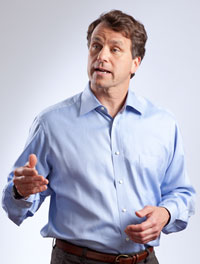 Former Allscripts Healthcare Solutions CEO Glen Tullman confirms to MobiHealthNews what has been rumored for weeks: He is working on a mobile health startup through his 7Wire Ventures investment vehicle.
Former Allscripts Healthcare Solutions CEO Glen Tullman confirms to MobiHealthNews what has been rumored for weeks: He is working on a mobile health startup through his 7Wire Ventures investment vehicle.
While he won't fully tip his hand now, Tullman says he is involved in a venture that will help mobilize treatment of chronic diseases both from the consumer side and for the purpose of population health management. The technology will run on mobile phones, according to Tullman, whom Allscripts ousted in December after a tumultuous couple of years trying to integrate the acquisition of former rival EHR vendor Eclipsys.
Expect further details on the startup in the next three months, he says.
Tullman sold electronic health records for 15 years, but, with the advent of "meaningful use", he believes EHRs are fast becoming a commodity. In his opinion, the most innovative health IT companies today — the ones that potentially will have the biggest impact on transforming a broken healthcare system — are looking at mobile technology.
"If you want to engage patients or consumers, you can either build a portal and hope they go to it, or you can go to them," he says.
"Use a device that's ubiquitous," Tullman advises. Cell phones are pretty close to ubiquitous in the US, and since last year, the majority of those with mobile phones have had smartphones, according to comScore and other market researchers.
He wants 7Wire Ventures, the Chicago-based investment firm he formed with ex-Allscripts President and COO Lee Shapiro, to back innovators. Tullman says 7Wire will invest in – and consider outright acquisitions of – IT and communications-related startups and growth-stage businesses in healthcare. (Investments to date, however, include SoCore Energy, which provides solar panels and services to commercial properties, as well as a glassblowing studio in the Windy City and a local chain of tea shops.)
Tullman says he is focusing on concepts that serve what he calls the "intelligent, connected consumer of health," not just a user of healthcare services.
The word "consumer" is key to Tullman. He wants to look beyond the third and final stage of meaningful use – which will not begin before 2016 – to what he calls "consumer engagement." That is an important distinction. "We need to stop thinking of people as patients," Tullman says.
"Health should be consumer-centric," he explains, not patient-centric. "When it doesn't work, then it becomes patient-centric." In other words, patients are sick, while consumers strive to stay healthy. "No one wants to be a patient," Tullman says. "You don't want to consume hospital services."
With some exceptions, healthcare of course is neither patient-centric nor consumer-centric today; medical practices historically have set hours more convenient for doctors than for patients. "No other business works 8 to 5 with a two-hour lunch break," says Tullman. While this may sound like bankers' hours, Tullman notes that banks went 24/7 years ago with ATMs and online services.
Consumer-friendly technology can bring healthcare – and health services – into the connected world. "Think of it as concierge care for everyone," Tullman says.
The former Allscripts boss says he is looking to address three questions with his new company's potential investments:
- "How do we reinvent the front end of healthcare," where consumers engage with the industry?
- "How do you use technology and devices to give [people] a better quality of life at lower cost?" This will involve a rethinking of the way consumers and professionals not only treat chronic diseases, but how they stay well. "Rethink how to treat chronic diseases," Tullman says.
- "Are there better ways to look at the whole health system?"
Like many others, Tullman divides the U.S. health sphere into two basic groups, the 80 percent or so of mostly healthy people who consume 20 percent of resources and the 20 percent with chronic diseases who account for about 80 percent of expenses.
Those in the former group want easy access to information that can help them stay in good health and easy access to care when they do get sick or injured, according to Tullman. "These potentially are intelligently connected health consumers," he says.
"We want to be connected to health consumers, not just care," he says of his investment team.
For the sickest 20 percent of the population, "We believe there are ways to use connected devices to deliver better healthcare," Tullman says, specifically mentioning remote patient monitoring. "This is information technology-enhanced services," he explains.
"It's not enough to have devices," Tullman continues. In his opinion, devices need to be connected and be backed by population management and care management services that add value to the technology.
"It all begins with this idea that we look at healthcare differently."
Tullman likes to tell the story of his son noticing an infected finger while the two were boarding an airplane together. The younger Tullman grabbed a smartphone, snapped a picture of the suspect digit and sent the image to the family's doctor. After asking a few questions by text, the physician wrote an electronic prescription for an antibiotic, and the drug was waiting at a pharmacy near the Tullmans' destination.
The physician later conducted a follow-up exam by FaceTime. "It worked great," Tullman says, but there was one major problem: "The doc said he didn't get paid for it."
As payment incentives shift away from fee-for-service, Tullman believes individuals will start to feel empowered with easy-to-use apps and other digital tools. "The more information they have, the better decisions they will make," he says.
"The moment you think about people as consumers, then everything changes."
Editor's note: Neil Versel and Glen Tullman both serve on the advisory board of Health eVillages.













